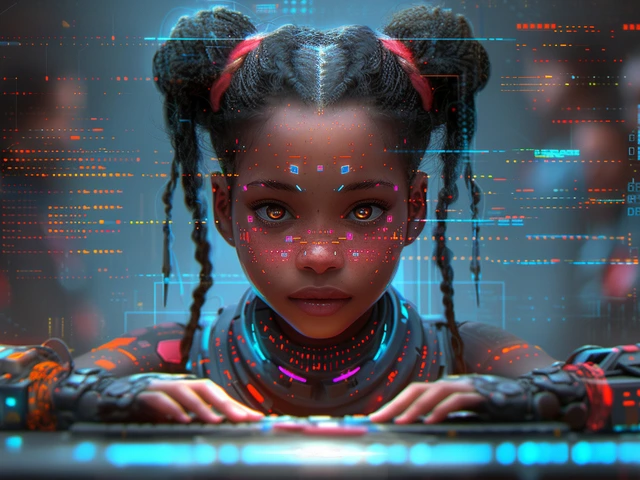Mastering AI Tricks: Navigating the Tech Revolution Successfully

Mastering AI Tricks: Navigating the Tech Revolution Successfully
Artificial Intelligence is no longer the stuff of science fiction. It's right here, shaping our world every day, and knowing how to ride this wave can make a profound difference in our careers and lives.
Understanding AI's potential and integrating it into our daily routines can seem daunting. But with some practical tips and a bit of curiosity, you can become skilled at using AI to your advantage.
Stay ahead by learning continuously and upskilling. The more you know, the better you can navigate the future. Remember, the ethical side of AI is crucial too. Balancing benefits with the challenges AI brings will be key to using this technology wisely.
So, dive in, explore, and let's master the AI tricks to lead the tech revolution!
- Understanding AI and its Impact
- Practical Tips to Integrate AI in Daily Life
- Learning and Upskilling for an AI-Driven World
- Ethical Considerations and Challenges
- Future Trends and Predictions in AI
Understanding AI and its Impact
Artificial Intelligence, more commonly known as AI, is transforming the world as we know it. It refers to the simulation of human intelligence in machines that are programmed to think and learn like humans. From the virtual assistants on our phones to sophisticated algorithms that predict our shopping preferences, AI is everywhere.
One of the significant impacts of AI is its ability to process and analyze enormous amounts of data quickly. This capability allows businesses to make informed decisions faster, significantly improving operational efficiency. For instance, banks use AI to detect fraudulent activities by analyzing transaction patterns, which saves them billions of dollars. Similarly, healthcare providers use AI to diagnose diseases more accurately by studying medical records and imaging data.
The integration of AI into the workplace has also transformed job roles across various industries. According to a report by McKinsey, about 50 percent of today's work activities could be automated by 2055, changing the nature of employment significantly. While this raises concerns about job displacement, it also brings opportunities for new types of jobs that didn't exist before, focusing on things that AI cannot do well, like creative thinking and emotional intelligence.
AI's impact on daily lives is also tangible. Virtual personal assistants like Siri and Alexa help us with everyday tasks, from setting reminders to managing smart home devices. AI-powered recommendation systems on platforms like Netflix and Spotify enhance our entertainment experience by suggesting content tailored to our tastes. The advancements in AI have also led to the growth of autonomous vehicles, promising safer and more efficient transportation systems in the near future.
One cannot discuss AI without addressing its ethical implications. The use of AI raises vital questions about privacy, security, and bias. For instance, facial recognition technology, while useful in security, has been criticized for infringing on privacy and potentially leading to surveillance misuse. Similarly, AI systems trained on biased data can perpetuate and even amplify existing prejudices, leading to unfair outcomes.
However, with the right measures in place, these challenges can be mitigated. Regulations and frameworks like the European Union's GDPR ensure that AI applications respect privacy and data protection principles. Additionally, ongoing research in creating fair and unbiased AI systems aims to address the ethical concerns linked to AI. As AI evolves, it's crucial to develop guidelines that balance innovation with ethical considerations.
Consider a well-known quote by Andrew Ng, a renowned AI researcher:
"AI is the new electricity. Just as electricity transformed almost everything 100 years ago, today I actually have a hard time thinking of an industry that I don't think AI will transform in the next several years."This quote encapsulates the transformative potential of AI, highlighting the vast scope of its influence across various sectors.
In summary, understanding AI's impact is pivotal in navigating the tech revolution. Its ability to process data swiftly, improve operational efficiency, and enhance daily life is remarkable. While ethical issues present significant challenges, the continuous development of fair and responsible AI systems holds the promise of a balanced technological future. Embracing AI thoughtfully and ethically will enable us to harness its full potential, driving innovation while safeguarding our values.
Practical Tips to Integrate AI in Daily Life
Artificial Intelligence can seem like a complex and distant concept, but the reality is that it is becoming an increasingly integral part of our daily lives. If this is the first time you are hearing about integrating AI into your routine, there is no need to worry. There are practical ways to embrace this technology in ways that can enhance your productivity and simplify tasks.
One of the simplest ways to start incorporating AI in your life is through the use of virtual assistants. Devices like Amazon's Alexa, Google Home, and Apple's Siri can help you manage your schedule, play music, control smart home devices, and answer almost any question you might have. These assistants are continuously learning and improving, making them more capable of handling a range of tasks.
Another handy application of AI is in email management. Services like Google's Gmail use AI to sort emails, filter out spam, and even suggest quick replies. By organizing your inbox efficiently, these AI-driven tools save you precious time and reduce stress. Automated scheduling tools like X.AI’s Amy and Andrew or Microsoft's Cortana can set up meetings and appointments without you having to lift a finger.
"The key to successfully integrating AI into daily life is to start with small steps and build up your comfort level," says John Smith, a tech expert at TechRadar. "Experiment with different AI tools and see which ones fit best into your routine."
Voice-to-text applications are another helpful way to integrate AI. Programs like Dragon NaturallySpeaking or the built-in dictation features in smartphones can transcribe your spoken words into text. This can be particularly useful for those who need to take quick notes, draft emails, or even write longer documents without typing.
Looking after your health is easier with AI-driven fitness and wellness apps. Tools like MyFitnessPal, which uses AI to track diet and exercise, can provide personalized recommendations based on your habits. Sleep tracking apps analyze your sleep patterns and offer insights for better rest. Even mental health apps like Woebot use AI to provide cognitive behavioral therapy right from your phone.
Enhancing Learning with AI
AI is not only useful for managing tasks but also for enhancing your learning. Educational platforms like Coursera and Khan Academy use AI to customize learning experiences based on your progress. AI tutors can provide additional assistance, ensuring you grasp difficult concepts. Adaptive learning technologies can make education more accessible and personalized.
Language learning apps such as Duolingo employ AI to adapt lessons to your learning speed and retention ability. They provide real-time feedback and adjust difficulty levels to ensure that you are continually challenged yet not overwhelmed. This makes learning new languages more efficient and enjoyable.
Financial management is another area where AI can be incredibly beneficial. Tools like Mint and Cleo use AI to help you track spending, create budgets, and even offer financial advice. These applications analyze your spending habits and provide insights to help you save money and make smarter financial decisions.
For those who love shopping, AI-powered recommendation systems in platforms like Amazon and Netflix analyze your past purchases and viewing history to suggest products and content tailored to your preferences. This not only improves your shopping experience by making it more efficient but also introduces you to items and shows you might not have discovered otherwise.
Integrating AI into daily life can significantly enhance your efficiency, learning, health, and leisure activities. While the technology might seem daunting initially, starting with small and manageable steps can help build your comfort and confidence in using AI, leading to a more streamlined and enriched daily experience.
Ethical Considerations and Challenges
As Artificial Intelligence advances, it brings up a myriad of ethical considerations and challenges that society must address. AI's capability to process vast amounts of data and make autonomous decisions raises concerns about privacy, security, and fairness. Let's delve into these critical issues.
One of the most pressing ethical issues is data privacy. AI systems need tremendous amounts of data to function effectively. This data often includes personal and sensitive information. How this data is collected, stored, and used can be problematic. For instance, AI's requirement for data has led to situations where individuals' privacy has been compromised without their explicit consent. A notable example is the Facebook-Cambridge Analytica scandal, where millions of users' data were harvested and misused without their knowledge.
Bias and fairness in AI is another major concern. AI algorithms are only as good as the data they are trained on. If the training data contains biases, the AI system is likely to reproduce and even amplify those biases. This was highlighted when facial recognition technology was found to have higher error rates in identifying people of color. Such biases can lead to unfair treatment and discrimination, which is unacceptable in any society.
"Artificial Intelligence can magnify the biases of its creators unless we take deliberate steps to confront fairness issues." – Kate Crawford, AI Researcher
Job displacement is a significant challenge posed by AI. While AI has the potential to create new job opportunities, it also threatens to automate many existing jobs, especially in sectors like manufacturing, customer service, and even some white-collar professions. This shift could lead to widespread unemployment and social unrest if not managed properly. Retraining and upskilling the workforce becomes critical to easing this transition.
Another ethical consideration is the use of AI in military and surveillance. AI-powered drones and autonomous weapons raise serious moral questions. The potential for AI to be used in mass surveillance also poses a threat to civil liberties and human rights. Balancing the benefits of AI in enhancing security with the need to protect individual freedoms is a delicate task.
Lastly, we must consider the transparency and accountability of AI systems. It's often unclear how AI reaches specific decisions, making it challenging to hold these systems accountable. This opacity, known as the 'black box' problem, can be dangerous when AI is used in critical areas like healthcare or criminal justice. Transparency in AI algorithms and decision-making processes is essential to build trust and ensure these systems are used responsibly.
Addressing these ethical challenges requires a multi-faceted approach. Policymakers, tech companies, and society at large must work together to create frameworks that ensure AI develops in a way that benefits all of humanity. Establishing ethical guidelines and regulatory policies, promoting transparency, and fostering public dialogue are key steps toward achieving this goal. By being proactive about these issues, we can harness the power of AI while safeguarding our values and principles.
Future Trends and Predictions in AI
Artificial Intelligence has grown by leaps and bounds, and its future is filled with exciting and sometimes unpredictable advancements. One of the first trends to look out for is the increasing integration of AI into everyday devices. From smart refrigerators that can recommend recipes based on what's inside, to AI-driven personal assistants that help manage our daily routines more effectively, these technologies are making life more convenient and seamless.
Healthcare is another area where AI is set to have a massive impact. Imagine visiting a doctor who uses AI to diagnose conditions with greater accuracy than ever before or accessing personalized treatment plans created by AI based on your unique health data. AI in healthcare isn't just a dream — it's happening now and will continue to advance, leading to healthier and longer lives.
In the realm of education, AI is transforming how people learn. Adaptive learning systems that tailor educational content based on the progress of individual students are becoming more common. Schools and universities are increasingly adopting AI-powered tools to enhance the learning experience, making it more personalized and effective. This trend will continue, making education more accessible and tailored to individual needs.
Industries like finance and retail are also embracing AI at a rapid pace. In finance, AI is used for more efficient fraud detection and personalized banking experiences. Retailers are using AI to optimize supply chains, improve customer service through chatbots, and even predict what products will be popular in the future. These applications not only increase efficiency but also enhance the customer experience.
AI ethics and regulations are starting to take the spotlight. As AI technologies become more sophisticated and integrated into various aspects of life, there's a growing need to address ethical considerations and create robust regulations. Responsible AI development ensures that AI technology benefits society as a whole and minimizes potential risks.
Most exciting are the unknown possibilities of what's to come. Quantum computing combined with AI holds the potential to solve complex problems that are currently beyond our reach. Autonomous systems, from self-driving cars to robotic workforce, could revolutionize industries and create new economic opportunities.
"AI has the potential to outthink, outpace, and outperform us in ways we've only begun to imagine. What we do with that potential is up to us," says famed technologist Ray Kurzweil.
As these trends indicate, the future of AI is not just about advancements in technology, but about transforming various facets of human life. Keeping an eye on these trends can help you stay prepared and even anticipate new opportunities that come with the AI revolution.
About
CH Tech Development is a premier resource for the latest updates and insights in the world of technology development. We provide extensive information, articles, and guides on cutting-edge technological advancements. Explore our site to empower your knowledge about the dynamic field of tech development.
Latest Posts


Mastering AI Tricks: Navigating the Tech Revolution Successfully
By Theodore Worth May 17, 2024

Coding Skills: A Powerful Asset in the Digital Economy
By Silas Hawthorne Jul 26, 2023

Artificial Intelligence: A New Approach to Cybersecurity
By Silas Hawthorne Jul 26, 2023

Write a comment